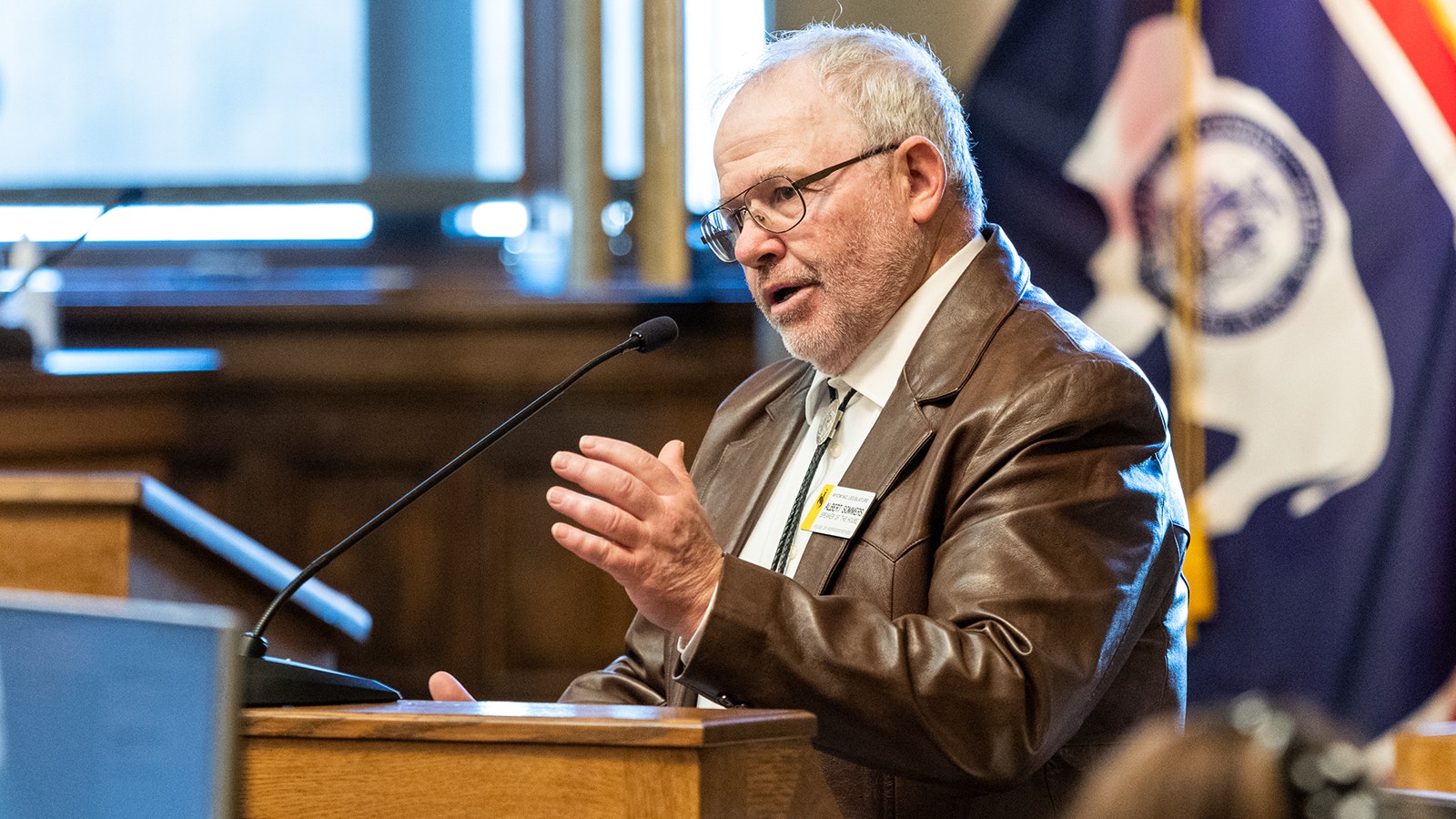There was one memory that always stuck with Speaker of the House state Rep. Albert Sommers, R-Pinedale, through the years; a senior citizen found in her home in Pinedale, surrounded by dog feces and an overall state of filth.
"It was such a visual," Sommers said. "In my mind, it seemed, just a horrible scene."
Sommers was told this story by the director of a local safe house. The director told Sommers how there isn't much in Wyoming law that directs the state in vulnerable adult cases like these.
"There wasnt really a place to put her," Sommers said.
This was part of the inspiration for Sommers to create a Mental Health and Vulnerable Adults Task Force in the Wyoming Legislature to address "gaps within the states health care systems."
"I thought it was an appropriate task force," Sommers said. "Really bring together the right people and the right space for it so we can learn more about it."
The Legislature's Management Council voted 5-3 on March 23 to approve creation of the Task Force.
Rep. Lloyd Larsen, R-Riverton, said the driving force behind the new task force is not necessarily to spend more money or create more government, but to develop new policy and procedures for better addressing mental health issues throughout the state.
"You don't always have to throw more money at it," he said. "You decide what the state's role is and what to throw at it."
Wyoming has had the highest suicide rate in the nation for the last few years and struggles with low funding and staffing for its public health services.
"We have gaps in the ability for our citizens to get services that they need to address mental health and we have a system in place that doesn't do anything to try to help the person with mental illness and substance abuse disorders to avoid the justice system," Larsen said.
Similarly, Larsen said there is also no framework in place for addressing mental health issues in K-12 schools, where he said there has been a significant increase in mental health issues seen. He said what can start as depression or anxiety in a child, can manifest into something much worse if left untreated down the road like self-harm or suicide.
"What type of services, what type of better services do we need to be providing these kids?" Larsen said. "How do we get out in front and help prevent that?"
He said the goal of the task force would be to help better resolve problems, whether through policy change or better use of current funds, to try to once and for all determine the role of state government in these issues.
Comes With A Cost
The task force has $50,000 allocated for its work during the interim session in 2023. It will meet three times in person, with three potential additional meetings, to develop legislative recommendations that can be used for committee bills.
Detractors of mental health projects and related investments have complained that they grow government under the guise of improving health care, a point many are skeptical can be achieved without solving much broader societal problems.
Many conservatives in the 2023 Legislature voted against various bills that would have increased spending on public health measures, such as permanently funding the states 988 suicide call centers and expanding Medicaid.
Others have adopted a more measured wait and see-type approach, pointing to the existence of already running programs.
Sen. Larry Hicks, R-Baggs, took this viewpoint when voting against the new task force. He found that the creation of a new task force would be "premature as Gov. Mark Gordon's health task force already has a subcommittee focused on mental health that has existed for two years."
"I am going to be a no, not because of the substance or what we are trying to accomplish here," Hicks said. "I just think, at this point in time, it is not ready for prime time, given all the other efforts that are out there, and not knowing how this either overlaps, complements or competes with those efforts."
Larsen said he agrees with Hicks argument against unnecessarily expanding government, but believes the issue needs to be examined first before making a decision.
"To make sure what we do is in accordance with the role of government, because is it the role of state government to provide mental and health services to every citizen of the state irregardless? I don't think so," Larsen said.
State Redesign
House Bill 38-Community behavioral health-priority populations passed during the 2021 legislative session, requiring the Wyoming Department of Health (WDH) to redesign its mental health and substance abuse system. The idea behind the bill was to better cover Wyoming's most vulnerable adults who may have fallen in between cracks in the system.
The purpose of the subcommittee was to work with community mental health centers, the Department of Corrections, Department of Family Services (DFS), and the WDH to orchestrate the redesign. These same groups will work with the new task force.
Another key part of the subcommittee work was not increasing funding, but rather, redefining and narrowing the populations the state would pay for.
What resulted was a new state hospital in Evanston and redesigned Life Resource Center in Lander.
Larsen reached out to Sommers and said he wanted to continue this type of mission with a more focused group to study other gaps existing in Wyoming's mental health system.
"Now we need to start laying the rest of that foundation or building of the structure on that foundation to take care of these gaps that are in place," Larsen said. "The key question is, what is the role of the state in any of those key areas?"
In doing their work, Larsen said the members were able to address other gaps in Wyoming's mental health care systems. One of the most prominent, Larsen said, is vulnerable adults.
Vulnerable Adults
Mental health issues can come in many different shapes and sizes and in older people, can sometimes show up in the form dementia.
When a report is received about a vulnerable adult, it's the job of DFS to investigate it, much like it would in a child welfare case.
"It's not at the level of the detail or the resources that the state maybe should be considering for that population, so we need to look at that," Larsen said.
Another vulnerable population identified is adolescents with high behavioral needs. Larsen said at any given time, the state has 10-12 minors whose behavior needs are so extreme, its challenging finding a place for them to go.
Facilities do exist for children with these issues like the Wyoming Behavioral Institute in Casper and Saint Joseph's Children Home in Torrington, but both operate with limited resources and capacity.
"Sometimes we have to try and find places for them out of state," Larsen said.
And in worst case scenarios, children have been housed in county jails when no other location can be found. Larsen said he finds this practice highly irresponsible.
"I think it's illegal," he said.
Sommers said vulnerable adult cases like the one involving the Pinedale senior citizen can be complicated, as these individuals often request to be placed back in the same situations where the initial abuse was occurring.
"The parent may want to stay with the grown up kids regardless of how the grown up kids may be treating them," Sommers said.
At first, Sommers thought the issue could be immediately addressed, and managed to get a little funding for DFS to handle these issues around five years ago. He soon realized this was only a stopgap surrounded by delicate complexities.
Although Sommers believes no easy answers exist, he still finds it an important problem to study and try to resolve.
"That was always kind of percolating in my mind," he said. "I couldn't really get a grasp on it like I wanted to and I felt like it really needed study."
"I want to try and understand that issue to see if theres solutions to help these people," he said.
Diversion
Larsen said time will also be spent studying how people with substance abuse issues and other mental health struggles can be diverted away from the judicial system and instead steered toward resources that will help them most.
"Maybe they've committed a misdemeanor and nothing really serious, what they don't need is jail time or a fine," Larsen said. "What they do need is a diversionary path that will allow them to get help."
Larsen said this will allow a better pathway for people to move on from difficult periods of their life without it hanging over them on their criminal record for the rest of their lives.
Last week, Larsen, two state Supreme Court justices and other state officials spent three days in Miami learning about the "Miami Model," a renowned jail diversion program.
"We've already done a lot of the stuff they've recommended for preliminary work to make this diversion successful," Larsen said.





